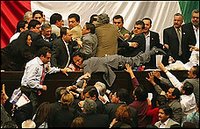Poor Mexico, So Far from Democracy, So Close to the United States

December 1 is the traditional day to inaugurate the president-elect in Mexico. A few days before the ceremony in Mexico City, deputies in the Mexican Congress physically shoved and pushed each other in order to take control of the podium. The aftermath of the controversial presidential elections has not yet subsided. Felipe Calderon takes over at a very delicate time in Mexican politics.
Once again, Mexican intellectual Enrique Krauze castigates Andres Manual Lopez Obrador for continuing to threaten democracy in Mexico. A few weeks ago, Lopez Obrador held his own unofficial inauguration and named himself the legitimate president of Mexico. He even maintains his own cabinet of ministers "in exile". Many commentators take Krauze's lead in thinking this tactic to be simply an expression of Lopez Obrador's "messianic personality" and "arrogance".
However, the creation of "parallel governments" or, states in exile, has long been considered one of the classical tactics of nonviolent civil disobedience. Gene Sharp, (of the Albert Einstein Institution) in his catalog of historical tactics of nonviolent direct action, lists it along with the maneuvers known to us from the work of activists such as Gandhi, King, and Chavez. Parallel governments are one way of registering noncooperation with a regime that is considered illegitimate.
The question becomes how long to continue the campaign of nonviolent resistance. Carlos Fuentes acknowledges that Lopez Obrador did a service in raising awareness of the problem of crippling poverty in Mexico and argues that the Mexican Left needs to find direction to lead. There are models and warnings, Fuentes says, in the recent developments in the rest of Latin America where in the past month Nicaragua and Ecuador have elected leftists to the presidency--joining a wave that includes Venezuela, Chile, Argentina, Bolivia, Brazil, and Uruguay.
However, neither Fuentes or Krauze say much about the other issue that was central to Lopez Obrador: renegotiation of NAFTA in order to mitigate the impact of neoliberal economic trade policy on Mexico. In our podcast last July, Victor Vargas argued that the effects of neoliberalism had to come to the forefront of political and ethical debates in order to understand what was going on in Mexico. Mexico's troubles with democratization are only exacerbated by its commitment, made in 1994, to tie its well-being to the success of free trade with the United States.
Labels: latin america, nonviolence


3 Comments:
Is there any evidence that the election was anything but legitimate?
- Dennis
Well, it depends on what you term legitimate. The margin of victory for Calderon was very narrow and some have suggested that election anomolies might be significant in the number of votes going one way or another. A very informed analysis is available at:
http://www.stanford.edu/~albertod/elections.html
You have to remember that election fraud is a very touchy subject in Mexico because it is widely believed that the 1988 elections were rigged to give the presidency to the PRI candidate Carlos Salinas de Gotari (who brought NAFTA to Mexico).
The danger of the strategy for Lopez Obrador in claiming electoral fraud is that his party, the PRD, made signficant gains in the Mexican Congress. So by challenging the results and calling fraud, the worry was that he was calling into question the election of PRD legislators.
Democracy is young in Mexico and the stakes are high. My point is to suggest that perhaps we should not dismiss the critics so quickly and trust the system to be working justly. This goes for the U.S. as well.
Hey,.. just bump into your blog,.. Congrats for it,...
if you can spare some minutes do visit mine at http://ahuizoteando.blogspot.com/
All the best,
Post a Comment
Subscribe to Post Comments [Atom]
<< Home